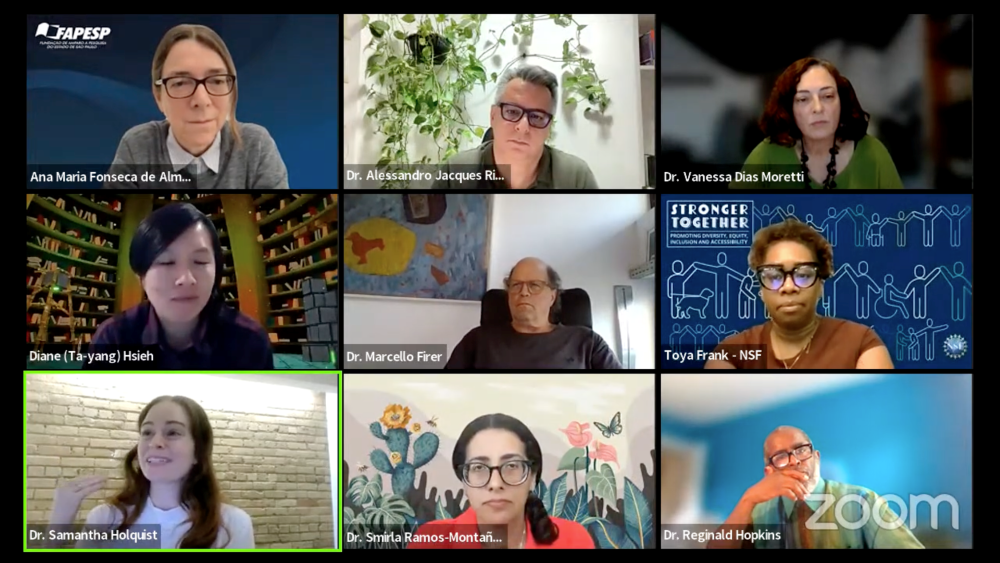


The webinar was one of a series designed to foster collaboration between researchers in the U.S. and São Paulo (image: screenshot taken during webinar)
Published on 06/24/2024
By Maria Fernanda Ziegler | Agência FAPESP – In the United States, the National Science Foundation (NSF) is funding a project to encourage parents and teachers of preschool-age children (3-5 years) to perform everyday activities relating to the construction of algebraic thinking – the ability to generalize, represent, justify and reason with abstract mathematical structures and relationships. The project targets Latinx families and is bilingual. Activities may take place at home or in the preschool.
Another U.S. initiative aims to reverse low engagement with mathematics among more than 5,000 Black and Latinx elementary school students.
In Brazil, a research project is being conducted at the Federal University of São Paulo (UNIFESP) with FAPESP’s support to gauge the impact of mathematics clubs on the development of algebraic thinking by elementary school students.
These were some of the initiatives presented in the first NSF-FAPESP webinar on STEM education, held on June 6 with the aim of fostering collaboration between researchers in the U.S. and São Paulo state. The participants described successful projects that addressed different aspects of mathematics teaching but focused on equity and enhancement of teaching methods in science, technology, engineering and mathematics (STEM).
“FAPESP and NSF have collaborated for a long time. We mean to foster new partnerships between researchers in the U.S. and São Paulo through the sharing of ideas, best practices and research results relating to enhancement of STEM education,” said Marcio de Castro Silva Filho, FAPESP’s Scientific Director.
Mathematics education is a gateway to STEM occupations, but despite the economic, educational, social and career implications of STEM education, access is unequal for minorities.
“In a world with so many scientific and technological advances, we know that one of today’s greatest challenges is promoting equity in STEM. Only with more involvement in these areas will it be possible to advance in science, technology and innovation. Lack of equity isn’t just a U.S. problem, it’s global. Hence the importance of exchanging experiences with Brazilian colleagues,” said James L. Moore III, Assistant Director of NSF’s Directorate for STEM Education.
Projects were presented on engagement of students with mathematics and expansion of mathematics teacher training. “In Brazil, teachers in the early stages of elementary school aren’t trained in mathematics. In addition, mathematics teaching is very deficient here. A study by the Basic Education Assessment System [SAEB] pointed to a 5.1 year learning lag in mathematics after 12 years of elementary and middle school. The pandemic made the situation worse, and the lag is now 6.5 years, or more than half the time these students attend school,” said Marcelo Firer, a professor at the State University of Campinas (UNICAMP), in his presentation of a project on teacher training.
Students begin lagging behind in mathematics in the early years of elementary school, he continued. “Of course, it’s worse for some groups, such as Black and Indigenous people, girls, and children from low-income households, but exclusion from mathematics is general in Brazil,” he said.
Low teacher pay is also a factor that restricts access to STEM education in both countries, the participants noted. “STEM teachers typically have two jobs and are always under stress. This hinders the execution of our research and even restricts access to the training courses we offer them,” said Vanessa Dias Moretti, a researcher at UNIFESP.
“We also have this problem in the U.S.,” said Samantha Holquist, a senior research scientist at Child Trends Inc. “STEM teachers are pressed for time. Even if we pay them to participate in research projects, it’s hard to get them involved.” She is conducting the project with 5,000 Black and Latinx schoolchildren on engagement in mathematics.
The online seminar also featured presentations by Alessandro Jacques Ribeiro of the Federal University of the ABC (UFABC), Diane (Ta-yang) Hsieh of Child Trends Inc., Reginald Hopkins of Virginia State University, and Smirla Ramos Montañez of TERC Inc.
The moderators were Toya Frank, Program Director for NSF’s Division of Research on Learning in Formal and Informal Settings (EDU/DRL), and Ana Maria Almeida, an advisor to FAPESP for its Equity, Diversity and Inclusion (EDI) in Public Education Program.
A video of the event is at: www.youtube.com/live/HGmA1yOlzg8.
Source: https://agencia.fapesp.br/52042